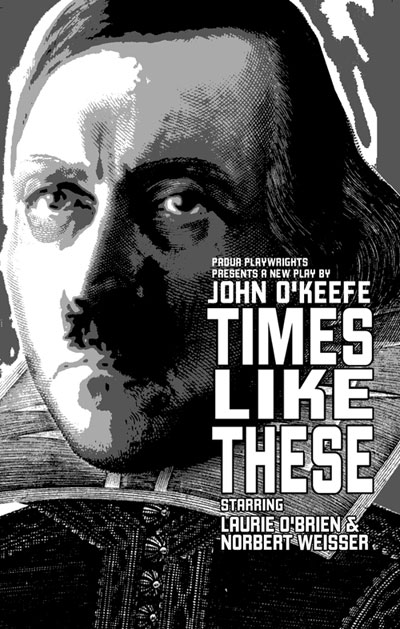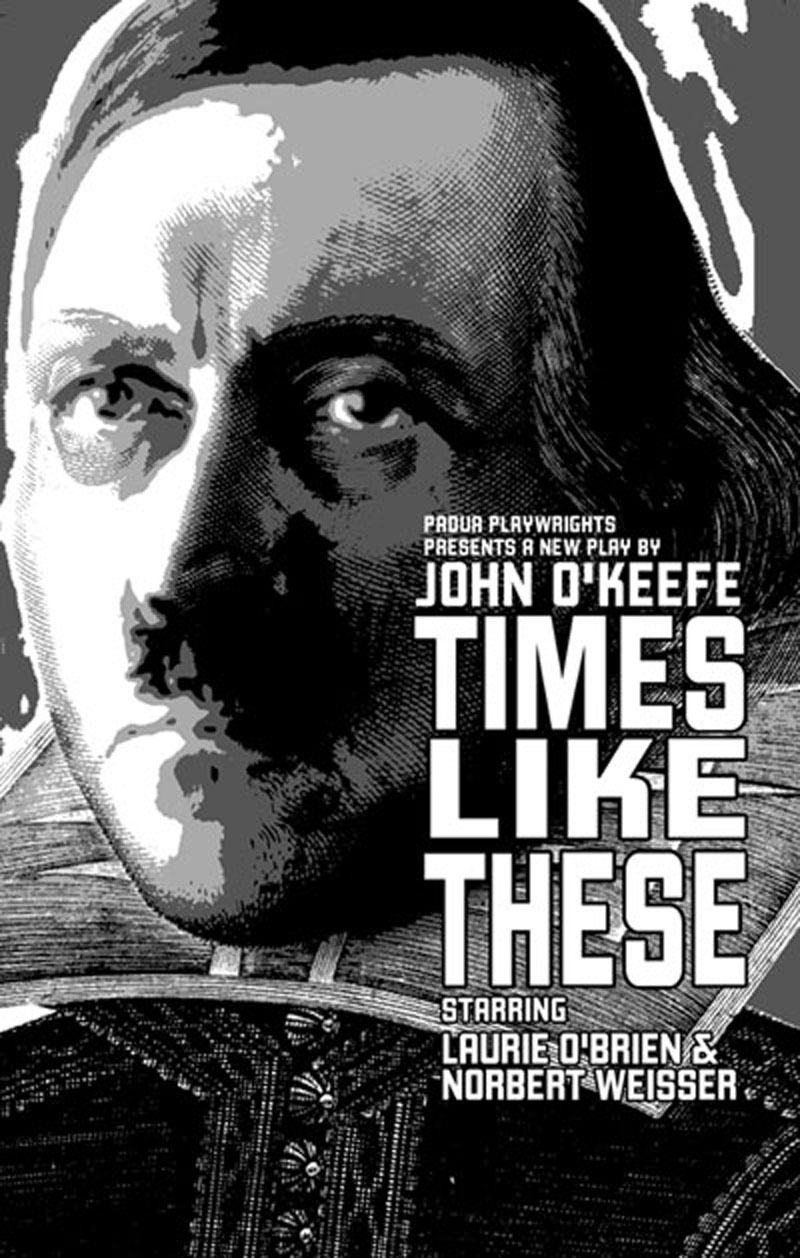Times Like These
Written and directed by John O’Keefe, 2100 Square Feet Theatre in October of 2002. The play takes place in Hitler’s Berlin between 1934 and 1938 and concerns Meta Wolff, Germany’s most famous actress, who is banned from the stage because she is a Jew. She attacks the only way she can: through her actor-husband, Oskar Weiss, whom she directs behind the scenes in a production of “Hamlet” to boldly satirize the Nazi regime. With Norbert Weisser and Laurie O Brien Lights by Rand Ryan, costumes by Bridget Phillips, original music and sound design by O-Lan Jones.

Those of us who work in theatre are used to hearing the art form disparaged as lumbering and archaic, a cultural dinosaur. Typically, we tend to concede the point, if only to move the conversation along to more pleasant topics. A play like John O’Keefe’s masterful Times Like These puts a stop to all that. The play is eminently relevant to anyone currently breathing air, and what it has to say could only be said by actors on a stage. Americans, certainly, should celebrate O’Keefe for how he illuminates the subversive connections between theatricality and totalitarian politics. Those charmed by George Bush and his folksy rancher act, for example, should pay close attention to O’Keefe’s depiction of the slowly encroaching darkness that enveloped German in the 1930s.
Standing should-to-shoulder with Mednick, Fornes and Steppling as one of the defining voices of the Padua Hills Festival, O’Keefe is a “man of the theatre” in the fullest sense of the term. Taking as its subject the leading lights of the Berlin stage during the 1930s, Times Like These is based on hard historical research (see the program insert.) But the playwright’s command of his medium shows in the substance of Times Like These as well as its subject matter. From the point of view of power, the play suggests, theatre is always seditious, underscoring as it does the illusory nature of appearances generally, and of social identity in particular. Here, as in George Orwell’s 1984, the playwright contrasts the naked power of the State on the one hand, with romantic love on the other. Love seeks to be only what it already is, whereas political might is defined by a desperate need to become something else. Naked aggression never wants to see itself when it looks into the mirror; those who sell us down the river expect to be flattered while they do so.
Guy Zimmerman – Artistic Director
The characters of Oskar Weiss and Meta Wolff are loosely based on the story of Joachim Gottschalk, one of Germany’s most popular film actors who was increasingly ostracized because his wife was Jewish. “I decided to skew the facts to form a story,” explains O’Keefe. “I made Meta the talented one. That worked for me because she’s a Jew, she’s not even allowed to enter the theater. I wanted to discover what it was like to experience the shrinking of civil rights, which is a concern a lot of us have today.”
Times Like These is the second in a triptych of plays that also includes “Glamour,” about Laura Riding and Robert Graves, and a work-in-progress tentatively titled “Goering and the Texan.”
Times Like These takes place in Hitler’s Berlin between 1934 and 1938 and concerns Meta Wolff, Germany’s most famous actress, who is banned from the stage because she is a Jew. She attacks the only way she can: through her actor-husband, Oskar Weiss, whom she directs behind the scenes in a production of “Hamlet” to boldly satirize the Nazi regime.
The characters of Oskar Weiss and Meta Wolff are loosely based on the story of Joachim Gottschalk, one of Germany’s most popular film actors who was increasingly ostracized because his wife was Jewish. “I decided to skew the facts to form a story,” explains O’Keefe. “I made Meta the talented one. That worked for me because she’s a Jew, she’s not even allowed to enter the theater. I wanted to discover what it was like to experience the shrinking of civil rights, which is a concern a lot of us have today.”
Times Like These is the second in a triptych of plays that also includes “Glamour,” about Laura Riding and Robert Graves, and a work-in-progress tentatively titled “Goering and the Texan.”
